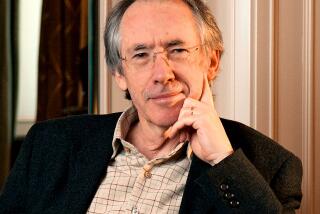A Cup of Rococo : LOVE’S MANSION, <i> By Paul West (Random House: $23; 339 pp.)</i>
- Share via
Paul West has written a partly fine memoir of his parents. He has brought them up out of the anonymity of two long lives spent in a small Derbyshire town. He has given them the distinctiveness if not quite the distinctness of literary characters; he has given them the indeterminate complexity of real ones.
So why “partly fine,” for a book in which the writing so often achieves an ache of discovery; a flash that, for a moment, makes all the world disappear, apart from the bit that is being addressed?
It is not a lack of skill or sensibility in this talented and original writer, author of “Rat Man of Paris” and “The Women of Whitechapel and Jack the Ripper.” It is more a point of literary philosophy. West practices partly in that vein of contemporary post-modern writing in which reality centers not in the story told--narrative and characters--but in the author’s voicing of it. This has always been true or partly true; Defoe’s voice forms the reality of the straightforward “Robinson Crusoe” as Donald Barthelme’s forms the reality of his intricately looped stories. It is different when the author’s voice declares itself to be the subject.
It is contemporary rococo, and that is not to put it down. Rococo had its triumphs; more to the point, it had its historic reasons. But it didn’t do all things well; an elaborately adorned frame is of little use around a quiet country interior. In any case, it is a brief charm that privileges the frame over the painting.
West’s memoir is partly fiction. Not only are the names changed--those of the two parents, Harry and Hilly Moxon, and of the son, Clive, who seeks out their recollections--but many of the recollections are hypothetical or invented. Clive is the hypothesizer, the inventor; and he keeps telling us so, to the point where the insistence blurs his subjects and shadows their light.
The light can be golden, particularly when Hilly and Harry were children and growing up in that Edwardian time before World War I, which so many English writers recall as Eden Lost. Their real names were Hildred and Hereward; an Anglo-Saxon fashion at the time trickled into even relatively modest households.
Within that modesty, Hilly was privileged: Daughter of the local butcher, she studied piano and had a room of her own in a house where luxury meant “a flat place for everything.” Harry’s father was a miner; they lived in a crowded up-and-down cottage and all he had, apart from love and decency, was the beef sandwiches his mother handed him each time he came in the door.
He was ardent and aspiring, though. And Hilly was up in aspiration’s way, even though--West’s prose has gaiety and grittiness--they both belonged to “families that required a great deal of washing.” The two children met at a church bell-ringing and thereafter were inseparable.
Hilly was forceful, forthright and talented enough to go to London to study. Harry was shy and dreamy, though what he dreamed of, other than Hilly, was battles and soldiers. His counterpart to her London honors was to write an essay on happiness that won him admittance to a distinguished and selective school. It was the peak of both their lives, right there at 15 or 16; then they tumbled and declined.
Hilly failed her piano exams by playing her pieces in the wrong order. Harry couldn’t attend his school because his family couldn’t afford books or uniforms. She returned, worked in the butcher’s shop and eventually became a piano teacher. He went to the war; afterwards, blinded in one eye and burnt-out, he would never do much of anything.
The double failure prompts one of the first principal interventions of Clive as would-be recorder of his parents’ lives. He is furious. Why was there no protesting the unfair decision that failed Hilly; why was there no effort to raise money for Harry’s clothes? Two budding stars were doomed to planetary dimness. He rages against the dimness, against the docility of expectation in Britain before the First World War: “Aspiration was a canker on the beanstalk of privilege and fame.”
That is a lovely phrase, and the raging is fine. But as the story moves on, and the dimness comes to encompass his father’s amiable post-war recessiveness, and his mother’s sparkier frustrations, the raging dwindles to fussiness, and into odd and distracting interventions.
Harry’s brutal experiences as a machine-gun sergeant in the trenches are told vividly and imaginatively; more effectively than in equivalent passages in Mark Helprin’s “A Soldier of the Great War.” A surreal bit here and there--a kind of phantom German spy appears in the guise of a British officer--makes it all the more real. The surreal effects intensify during Harry’s miserable stay in a Belgian hospital with shrapnel in his eyes. Unable to see, he is devotedly nursed and then seduced lavishly and protractedly by a mysterious nurse.
In fact, Clive tells us, he had only a hint or two that his father may have had some kind of fling with a nurse. The sexy details, the atmosphere, the states of mind and feeling are all invented. The writer--Clive as West’s alter ego--comes to the aid of the son frustrated by his parents’ reserve, their blank spots, and perhaps their blank realities. “My father had the life over there he talked about; all I am doing is consummating it for him,” Clive remarks of the post-Penthouse story he has elaborated.
Other such extrapolations and inventions are interwoven with genuine memories as the story moves into its long minor key. We read of the drab life and the chilly though devoted distance between Hilly and Harry through the postwar years, the Second World War and into the near present. It is not all minor; there are passages of sweetness, and a tenderness the more effective for the elusive way in which it is told.
The problem I have with “Love’s Mansion” is not the mingling of the imagined and the remembered. West invents beautifully, and his writing lives up to his invention. There is nothing wrong with a dream-memoir.
What vitiates and frustrates it is the emphasis given to the inventor and dreamer. Here I am, inventing, or wondering what to invent, Clive keeps reminding us. His reminding inevitably becomes the subject of the book. The vitality of narration and the energy of belief are eroded. Clive’s fussing drains the light from Harry and Hilly, not because he is inventing but because he makes such a point of telling us that he is. He is a theory about a story that continually gets in the way of the story. It is like going to dinner, watching the hosts perform all kinds of marvels with their recipes, and not getting to eat.
And after all, if all narratives are arbitrary and devoid of any reality but that of the authors and readers, West did have two to choose from. The story of Clive as writer is just as arbitrary as that of Hilly and Harry, but much duller. Why not stick with them?
More to Read
Sign up for our Book Club newsletter
Get the latest news, events and more from the Los Angeles Times Book Club, and help us get L.A. reading and talking.
You may occasionally receive promotional content from the Los Angeles Times.







